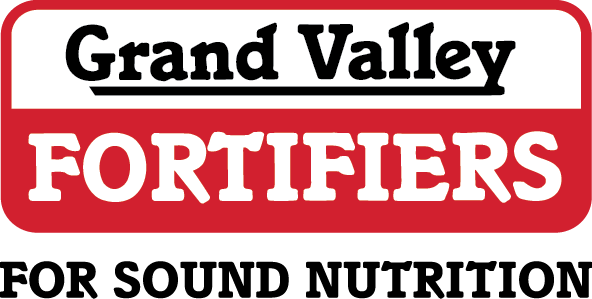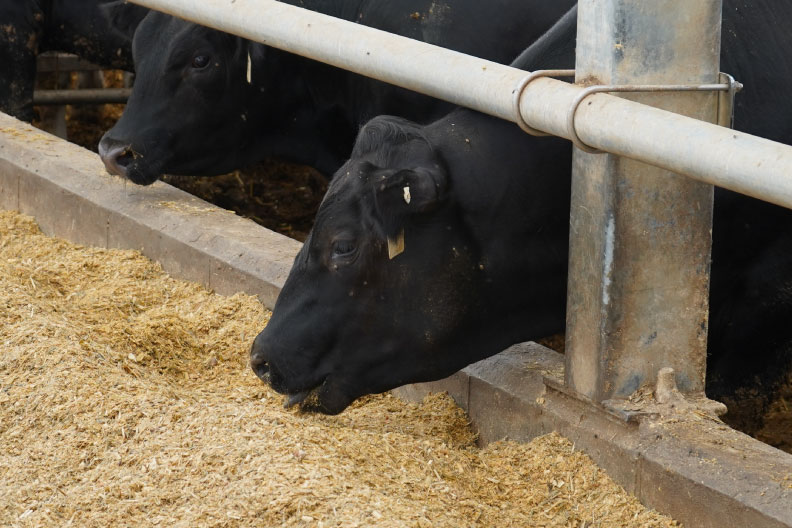By Tom Bowman
Beef Specialist,
Grand Valley Fortifiers
Minerals can be divided into two categories; macro minerals that are required in larger quantities and micro or trace minerals that are required in very small amounts. Macro minerals required by feedlot cattle are calcium, phosphorus, magnesium, sodium, chloride, potassium and sulphur and their levels are reported as percent of a feed or dry matter intake with requirements ranging from 10 – 70 grams per day. The micro minerals include zinc, manganese, copper, iodine, cobalt and selenium with requirements of a couple to several hundred milligrams per day and reported as mg/kg of a feed or dry matter intake.
Calcium, phosphorus and magnesium are needed for maintenance, skeletal growth and bodyweight gain. In typical corn based feedlot diets with little or no hay calcium must be supplemented in large amounts to meet optimal requirements for rapid growth. Very little or no added phosphorus are usually required in typical feedlot diets and when high levels of corn co-products such as corn gluten feed and distillers grains are fed care must be taken not to feed excessive amounts of phosphorus. Cattle require larger amount of potassium than any other mineral for feed intake and maximum weight gain and may often require additional supplementation from a premix or supplement on high corn diets with urea that include very little hay or soybean meal. Sodium is essential for feed intake, maintenance and growth and must be supplemented by including adequate salt in a supplement or premix in the ration.
Micro or trace minerals and fat soluble vitamins A, D and E are also required for maintenance and growth (for example: vitamin D is essential for calcium and phosphorus utilization for bone growth), but they also have very important roles for immunity and health of feedlot cattle. Amounts required for immune function and health will vary according to the amounts of stress that cattle are under, everything from disease challenges, shipping and handling, to overcrowding and heat or cold stress. The greater the challenges from these stressors, the greater the requirements of cattle for micro minerals such as selenium, copper and zinc and for vitamins A and E. Hence, although we will seldom ever see classical deficiency symptoms, even in poorly supplemented cattle, health and performance may suffer when vitamins and minerals are supplemented at less than optimum levels. Feeding a superior quality premix or supplement more highly fortified with essential minerals and vitamins can help to maintain better cattle health and improve performance, especially in times of disease or environmental stress.
When it comes to micro minerals, source of minerals is just as important as the amount of minerals that are supplemented. Organic sources such as amino acid complexed zinc and selenium yeast are much more highly available for absorption and result in superior health and performance benefits compared to the normal inorganic sources of these minerals. These can be very beneficial for improving immunity and health in highly stressed animals such as receiving calves during the first month on feed. Additionally, numerous research trials and commercial feedlot experience have shown that amino acid complexed zinc, Availa-Zn, helps to improve foot health in feedlot cattle, reducing incidence of foot rot and increasing average daily gain and feed efficiency.
Water soluble vitamins, the B vitamins, are produced by rumen bacteria in cattle and do not need to be added in premixes or supplements for normal health and performance. However, a couple of these vitamins, biotin and thiamine may be beneficial to supplement in some cases. Biotin is very important for strong hoof horn growth and for energy metabolism in cattle. Research in both dairy and beef cows shows that supplementing biotin reduces incidence of hoof claw disorders and in the case of dairy cattle, increases milk production due to improved energy metabolism. The application in feedlot cattle is fairly obvious – feeding biotin along with Availa-Zn may improve hoof health and increase rate of gain and feed efficiency resulting from reduced lameness and improved energy metabolism.
Feedlot cattle on high grain diets are sometimes prone to thiamine deficiency and a nervous system disease called polioencephalomalacia. Thiamine, which has a central role in carbohydrate metabolism, is injected to treat cattle with this disease and some nutritionists recommend feeding thiamine to help prevent deficiency on high grain finishing rations and reduce the risk of this disease, although this has not been proven in research trials.
Vitamin E and selenium are both major anti-oxidants that, in addition to their key roles for immunity and health, also have a significant impact on meat quality. Supplementing finishing cattle with higher amounts of vitamin E and feeding a selenium yeast source are well proven to improve the colour and increase the shelf life of beef.
In conclusion, always be sure that your feedlot cattle are receiving optimum amounts of minerals and vitamins, not so much to prevent
deficiency, but to maximize health and performance. Strategic feeding of higher quality premixes containing organic mineral sources and extra vitamins really pays off for highly stressed cattle such as receiving calves. Consider inclusion of Availa-Zn and biotin for reducing lameness and increasing rate of gain and feed efficiency in feedlot cattle – research shows that it pays. Failure to optimize mineral and vitamin nutrition can cost you performance and money.
For more information on Grand Valley Fortifiers Beef mineral products or if you desire to review your current mineral program, please call us directly at 1-877-567-4400. We are here to help maximize your herd health.
This article was written for the Spring 2017 Beef Grist. To read the whole Beef Grist, click the button below.

